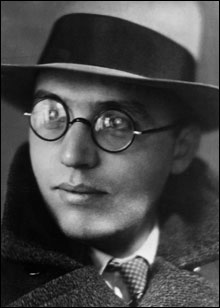
KURT WEILL: It’s not an anniversary, but that
doesn’t mean his music isn’t more timely than
ever. |
The Cantata Singers’ promising Kurt Weill season (“Unveiling Weill”) features a number of local premieres and other seldom performed pieces by the composer of Die Dreigroschenoper, Mahagonny Songspiel, and Lady in the Dark. Weill was born in 1900 and died in 1950, so this year isn’t even a major anniversary. But Cantata Singers director David Hoose must feel that Weill’s music is more timely than ever.
In Der Lindberghflug (“The Lindbergh Flight”), Hoose announced before its first Boston-area performance, Weill was making an effort to move from “I” to “we.” Charles Lindbergh’s first transatlantic flight, May 20, 1927, was one of those moments in 20th-century history when the entire world joined in celebrating a major human achievement — in this case an American achievement. Not much “we” in the world right now. Within two years, Weill, with additional music by Paul Hindemith, had set a text by Bertolt Brecht about this landmark event, as a half-hour-long cantata conceived for radio broadcast (another way to celebrate technological progress). Later in 1929, Weill replaced Hindemith’s sections with five new sections of his own. This version was finally published in 1982.
It’s a gem. The music is inventive and memorable, both ironic and haunting. Some of it echoes recent Weill: Lindbergh is introduced by a tango with a woozy clarinet solo out of Dreigroschenoper and Mahagonny (“My name is Charles Lindbergh. I was born in America” — in Lys Symonette’s effective English translation, which Hoose chose). The bass soloist tries to sing Lindbergh to sleep accompanied by a clarinet lullaby. A phantom fog (the chorus, in one of several roles), resenting the attempt to inhabit the sky, tries to obscure the pilot’s vision in a labyrinthine fugue. A later fugue, surrounding Lindbergh’s spoken expressions of determination (“I must arrive!”), recalls the solemn Masonic ritual in Mozart’s Die Zauberflöte. When Lindbergh sings to his plane, the vocal pauses are filled by the sinister yet hopeful rumble of the bass drum.
The Cantata Singers chorus and orchestra were in top form. And so were the soloists: bass-baritone Mark Andrew Cleveland narrating, baritone David Kravitz as the voice of New York City (together they have a funny scene as Scottish fishermen convinced that anything made out of iron or steel would fall into the water), and tenor William Hite as a heroic Lindbergh. Hoose built the piece to an inexorable climax.
The venue itself contributed to the excitement. This special fundraising benefit took place in a hangar at the non-profit Collings Foundation Aviation Museum out in picturesque Stow. Performers and audience were surrounded by planes from Bob Collings’s historic collection, among them a reconstruction of a Wright Brothers glider and an original Red Baron. (Collings also has an impressive collection of antique cars that includes one of the 470 Duesenbergs ever made and Al Capone’s Cadillac). The acoustics were clear and vibrant.